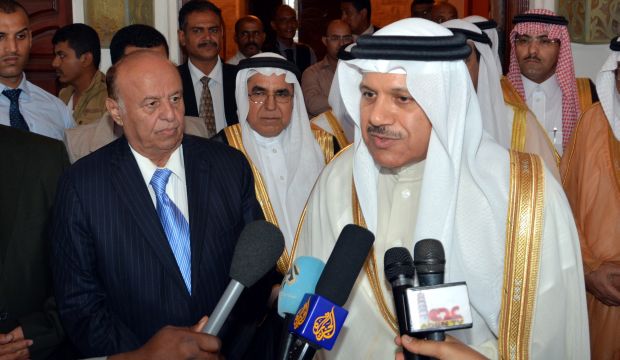
Secretary General of the GCC Abdullatif Al-Zayani (R) speaks to media after meeting with Yemeni President Abd Rabbuh Mansur Hadi (L) in the Presidential Palace in Aden, Yemen, on February 25, 2015. (EPA/Stringer)
Riyadh and Sana’a, Asharq Al-Awsat—The ambassadors of Saudi Arabia and Qatar on Wednesday resumed their work in Aden, the Red Sea port city where Yemen’s President Abd Rabbuh Mansur Hadi fled after escaping house arrest in Sana’a imposed by the powerful Houthi movement, a Gulf source told Asharq Al-Awsat.
The two Gulf Cooperation Council (GCC) members shut down their embassies in Sana’a and evacuated their staff mid-February citing concerns over deteriorating security.
The official who spoke to Asharq Al-Awsat on the condition of anonymity said the remaining GCC member state ambassadors will resume their jobs in Aden once embassy offices are secured.
The six-member council strongly condemned the Houthi takeover and the group’s dissolution of parliament on February 6, which it described as a “coup.”
The embattled president managed to escape Sana’a on Saturday, retracting his resignation and re-assuming his position as the legitimate president of Yemen.
By moving their embassies from Sana’a, the Gulf states intended to send a message of support to President Hadi and the Yemeni people who oppose the Houthi coup, the official, who accompanied GCC Secretary General Abdullatif Al-Zayani on his visit to Aden on Wednesday, added.
Hadi received a delegation that included Zayani, UN Special Envoy to Yemen Jamal Benomar, and the ambassadors of the six Gulf States to Yemen in Aden.
“[Zayani] confirmed to Hadi the absolute support of the GCC for [him] and Yemen to overcome its current ordeal and its backing of the legitimacy represented by the president . . . and [state] institutions,” the source said.
The two sides discussed international and regional efforts to help restore the entire country to state authority, and the need for Arab and non-Arab countries to move their embassies to Aden, the source maintained.
Hadi said he was committed to preserving the unity of Yemen; the GCC initiative that forced former president Ali Abdullah Saleh from power in 2012; and the outcomes of the National Conference Dialogue, according to the official.
Meanwhile, the UN Secretary-General Ban Ki-moon held direct talks with Houthis on Wednesday to urge them to lift the house arrest on Prime Minister Khaled Bahah and Foreign Minister Abdullah Al-Saidi.
Hadi, who is also the supreme commander-in-chief of Yemen’s armed forces, issued a presidential directive on Wednesday forming an operations room, dubbed “May 22”, the date the union between the North and South Yemen was established, to “carry out tasks and routine duties aimed at maintaining security and stability” across the country.
“Those measures come within the context of . . . putting in order the internal house of the presidential institution and the Yemeni state after they have been barbarically destroyed by the Houthis over the past few months,” a source close to Hadi told Asharq Al-Awsat.
The Houthi movement, which controls the northern part of Yemen, referred Hadi to the public prosecutor’s office on Wednesday over alleged offences he committed during his term in office.
Speaking to Asharq Al-Awsat Hadi’s adviser Faris Al-Saqqaf said the step represents “a continuity of the fait accompli authority imposed by Houthis.”
The official warned that unless UN-sponsored talks continue, “confrontation will be inevitable.”
Arafat Madabish contributed reporting from Sana’a
